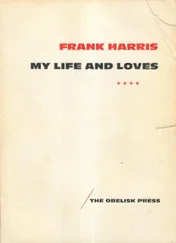Frank Harris - My life and loves Vol. 2
Здесь есть возможность читать онлайн «Frank Harris - My life and loves Vol. 2» весь текст электронной книги совершенно бесплатно (целиком полную версию без сокращений). В некоторых случаях можно слушать аудио, скачать через торрент в формате fb2 и присутствует краткое содержание. Жанр: Эротика, Секс, на английском языке. Описание произведения, (предисловие) а так же отзывы посетителей доступны на портале библиотеки ЛибКат.
- Название:My life and loves Vol. 2
- Автор:
- Жанр:
- Год:неизвестен
- ISBN:нет данных
- Рейтинг книги:4 / 5. Голосов: 1
-
Избранное:Добавить в избранное
- Отзывы:
-
Ваша оценка:
- 80
- 1
- 2
- 3
- 4
- 5
My life and loves Vol. 2: краткое содержание, описание и аннотация
Предлагаем к чтению аннотацию, описание, краткое содержание или предисловие (зависит от того, что написал сам автор книги «My life and loves Vol. 2»). Если вы не нашли необходимую информацию о книге — напишите в комментариях, мы постараемся отыскать её.
My life and loves Vol. 2 — читать онлайн бесплатно полную книгу (весь текст) целиком
Ниже представлен текст книги, разбитый по страницам. Система сохранения места последней прочитанной страницы, позволяет с удобством читать онлайн бесплатно книгу «My life and loves Vol. 2», без необходимости каждый раз заново искать на чём Вы остановились. Поставьте закладку, и сможете в любой момент перейти на страницу, на которой закончили чтение.
Интервал:
Закладка:
But at the time the growth of Germany and its eager intellectual life only confirmed me in the belief that by nationalizing the land and socializing the chief industries such as railways, gas and water companies, which are too big for the individual to manage, one could not only lift the mass of the English people to a far higher level, but at the same time intensify their working power. It would surely be wise to double the wages of the workman when you could thereby increase the productivity of his labour. Moreover the nationalization of the railways, gas, water and mining companies would give five millions of men and women steady and secure employment and sufficient wages to ensure decent conditions of life; five millions of workmen more could be employed on the land in life-leases, and in this way Great Britain might be made self-supporting and her power and wealth enormously increased.
I tell all this because I resolved to make myself a social reformer and began to practice extempore speaking for at least half an hour daily.
From Goettingen after three semesters I went to Berlin; it was tune; I needed the stimulus of the theatre and galleries of art and the pulsing life of a great city. But there was something provincial in Berlin; I called it a Welt-dorf, a world-village; yet I learned a good deal there: I heard Bismarck speak several times and carried away deathless memories of him as an authentic great man. In fact, I came to see that if he had not been born a Junker in a privileged position and had not become a corps-student to boot, he might have been as great a social reformer as Carlyle himself. As it was, he made Germany almost a model state. He was accused in the Reichstag one day by a socialist of having learned a good deal from Lassalle; he stalked forth at once and annihilated his critic by declaring that he would think very little of anyone who had had the privilege of knowing that extraordinary man and had not learned from him. It was Bismarck, I believe, who was responsible for the first steps towards socializing German industries; Bismarck who established the land-banks to lend money on reasonable terms to the farmers; Bismarck too who dared first to nationalize some German railways and municipalize gas and water companies; and provide for the extension by the state of the canal system.
Under his beneficent despotism, too, the municipalities of Germany became instruments of progress; slums disappeared from Berlin and the housing of the poor excited the admiration of even casual foreign visitors; his bureausbureaus, providing suitable employment, were copied timidly forty years later in London. It is not too much to say that he practically eradicated poverty in Germany.
The great minister himself anticipated that his attempts to lift the lowest class to a decent level would hem industrial progress and make it more difficult for the captains of industry to amass riches, but in this he was completely mistaken. He had given help and hope to the very poor, and this stimulus to the most numerous class vivified the industry of the whole nation; the productivity of bureaus increased enormously: German workmen became the most efficient in the world, and in the decade before the great war, the chief industries of steel and iron, which twenty years before were not half so productive as those of Great Britain, became three and four fold more productive, and showing larger profits, made competition practically impossible. The vivifying impulse reached even to the shipping, and while it became necessary for the British government to help finance the Cunard line, the Hamburg-America became the chief steamship line of the world and made profits that turned English shippers green with envy: immigration into Germany reached a million a year, exceeding even that into the United States. And this astounding development of industry and wealth was not due to natural advantages, as in the United States, but simply to wise, humane government and to better schooling. Every officer on a German liner spoke at least French and English as well as German, whereas not one English or French officer in a hundred understood any language save his own.
Looking over the unparalleled growth of the country and its prodigious productivity and wealth, it is hardly to be wondered at that the ruler ascribed the astonishing prosperity to his own wisdom and foresight. It really appeared that Germany in a single generation had sprung from the position of a second rate power to the headship of the modern world. And already in the early eighties, the future development could be foreseen. I spent one month of my holidays in Dusseldorf and Essen and was struck on all hands by the trained and cultured intelligence of the directors and foremen of the chief industries. The bureaus saving appliances alone reminded me of the best industries in the United States; but here there was a far wider and yet a specialized intelligence. Someday soon the whole story will be told properly, but even now in 1924 it's clear that the rival nations, instead of following Germany and bettering Bismarck's example, are resolved on degrading, dismembering and punishing her. It makes one almost despair of humanity.
After Goettingen and Berlin, I went to Munich, drawn by the theatre and Opera-House, by Ernst Possart, the greatest Shylock I ever saw and assuredly the best-graced, all-round actor, except the elder Coquelin, who ruled the stage and was perfection perfected. And the music at Munich was as good as the acting: Heinrich Vogl and his wife were both excellent interpreters and through them, as I have told, I came to know Richard Wagner. In my fourth volume of Contemporary Portraits I've done my best to picture him in his habit as he lived; but I left out half-consciously two or three features which it seemed to me hardly right to publish just when I had learned in 1922 that Cosima Wagner was still alive. Here I may be franker. In my "portrait" I left it half in doubt as to the person who was the Isolde, or inspiring soul, of that wonderful duo of love which is the second act of Tristan. Of course there is no doubt whatever that Mathilde von Wesendonck was Wagner's Isolde; he wrote it to her in so many words: "Throughout eternity I shall owe it to you that I was able to create Tristan."
In her widowhood Mathilde retired to Traunblick near Traunsee in the Bavarian Alps, and I might have seen her there in the wonderful summer of 1880 which I spent in Salzburg; but hardly anyone knew her importance in Wagner's life till after her death in 1902, when she left instructions to publish the 150 letters he had written her and the famous journal in the form of letters to her, which he wrote in Venice immediately after then-separation.
He found a great word for her. "Your caresses crown my life," he wrote. "They are the joy-roses of love that flower my crown of thorns;" and Mathilde deserved even this praise: she was, as he said, always kind and wise, and above even her lover in living always on the heights. He complained one day to her that Liszt, his best friend, did not fully understand him. "There could be no ideal friendship," he added, "between men." At once she recalled him to his better self: "After all, Liszt is the one man most nearly on your level. Don't allow yourself to underrate him. I know a great phrase he once used about you: 'I esteem men according to their treatment of Wagner.' What more could you want?" And her charming poetic word for their days of loving intimacy:
"The heart-Sundays of my life." If ever a man was blest in his passions, it was Richard Wagner.
And yet here, too, when at his best he shows the yellow streak. In 1865, six years after the parting with Mathilde, he allowed Madame von Bulow to write-it is true: "In the name of his Majesty, the King of Bavaria," to Mathilde, to ask her for a portfolio of articles and sketches which Wagner in the days of their intimacy had confided to her keeping. Naturally Mathilde wrote in reply directly to Wagner, giving him a list of everything in the portfolio, and adding finely: "I pray you to tell me what manuscripts you want and whether you wish me to send them?" In the cult of love women are nearly always nobler and finer than the best of men: Wagner's answer that the King wanted to publish the things did not excuse him for having allowed Cosima to crow over her great rival. But in publishing Wagner's letters to her and his Venice journal, Mathilde got even with Cosima; yet again Cosima was not to be outdone. She had left Von Bulow for Wagner, preferring, as someone said, "God to his Prophet"; but she, too, could reach the heights.
Читать дальшеИнтервал:
Закладка:
Похожие книги на «My life and loves Vol. 2»
Представляем Вашему вниманию похожие книги на «My life and loves Vol. 2» списком для выбора. Мы отобрали схожую по названию и смыслу литературу в надежде предоставить читателям больше вариантов отыскать новые, интересные, ещё непрочитанные произведения.
Обсуждение, отзывы о книге «My life and loves Vol. 2» и просто собственные мнения читателей. Оставьте ваши комментарии, напишите, что Вы думаете о произведении, его смысле или главных героях. Укажите что конкретно понравилось, а что нет, и почему Вы так считаете.






![William Frith - John Leech, His Life and Work. Vol. 1 [of 2]](/books/747171/william-frith-john-leech-his-life-and-work-vol-thumb.webp)
![William Frith - John Leech, His Life and Work, Vol. 2 [of 2]](/books/748201/william-frith-john-leech-his-life-and-work-vol-thumb.webp)




